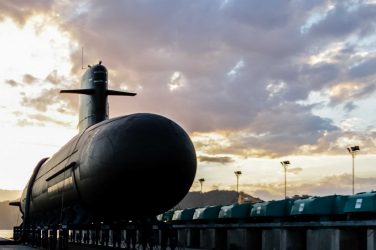Holding a plastic bottle of toxic mercury with his bare hands on an illegal gold mining barge in the Amazon basin, the 22-year-old miner says he is well aware of the dangers of the job.
In shorts and sandals, he lights a blow torch, training a blue flame on a piece of ore which his barge dredged up from the bottom of the Madeira River in Brazil’s northwestern Rondônia state, on the border with Bolivia.
Hundreds of similar barges – fashioned from plywood and metal and powered by roaring diesel motors – troll the rivers of the world’s largest rainforest leaving trails of destruction in their wake, according to government officials.
“I know this is a bit dangerous, but what else am I going to do to make a living here?” said the miner, who spoke on the condition of anonymity due to his involvement in illegal activity. When asked about safety equipment he just laughed.
Tens of thousands of illegal miners – or “garimpeiros” as they are known – have poured into the Amazon rainforest in Brazil, Peru, Bolivia, Venezuela and Colombia looking to strike it rich.
The gold rush has decimated the forest in parts of Amazon, while poisoning people who depend on the rivers for their food with mercury and other toxins used in the extraction process.
The illicit industry is fueled by the trafficking of men to extract the gold and women to work as prostitutes servicing miners, according to Brazilian prosecutors.
Big, Dirty Business
With billions of dollars at stake and complex criminal networks laundering illegally-mined gold across borders, officials admit they are struggling to contain the problem. “We have immense difficulties,” Ranilson Monteiro Câmara from Brazil’s Ministry of Mining admitted in Porto Velho, Rondônia’s gritty state capital.
Dozens of boats with no legal registration openly haul gold out of the river just two kilometers from his office.
Câmara said he is the department’s only official in Rondônia State responsible for monitoring the garimpeiros and their billion dollar industry.
“Levels of irregular (mining) activity on the river are high,” Câmara said. Inspectors and other officials are working to try shutter illegal boats, while formally registering others so they can operate legally, he said.
It’s no easy task.
In a given year, illegal miners ship 40 tons of gold extracted from across the Amazon into the United States, according to a 2016 study by Verite, a Massachusetts-based watchdog. This is nearly twice the legal gold exports from the five Amazonian nations covered by the study.
Between 2006 and 2016, 68 tons of gold were illegally extracted from the Amazon and smuggled out of the region through Bolivia, according to the Global Initiative Against Transnational Organized Crime.
Illegal miners dump more than 30 tons of deadly mercury into Amazon Rivers each year, poisoning fish and causing brain damage to people living hundreds of kilometers (miles) downstream, according to the Carnegie Amazon Mercury Project, a U.S.-based scientific group.
Attempts at Regulation
Gold producers, for their part, say they are unfairly stigmatized as bandits despite many working within the law.
“We are seen as bad by society, but actually we work, pay tax and support the local economy,” said Fabiano Sena Oliveira, a senior member of a gold producers’ cooperative in Rondônia.
Only 20 percent of the miners operate illegally, Oliveira said from a storefront with barred windows where he buys and sells gold.
Cooperatives of mining boat owners are working to improve their environmental monitoring, and to make sure people register with authorities and pay their taxes, said Oliveira, a huge man wearing a gold chain and Ralph Lauren polo shirt.
“In the past it’s true miners used a lot of mercury,” he said, but today they use far less as it is expensive.
As part of the mining process mercury is mixed with rocks dredged from the bottom of the river. The mixture of mercury and sediment is then heated up, helping to separate the gold.
But visits to garimpeiro boats appeared to contradict his remarks about miners moving away from mercury use.
Life on the Boats
Sidney Magrão has spent the past 35 years as a garimpeiro. He works on a large mining boat with a powerful tube which sucks sediment from the bottom of the Madeira River. Miners on the boat then sift through the rocks and dirt for tiny pieces of gold.
Magrão started off in the business wading into small rivers with a hand-held tube and is now a senior operator on a boat worth 3 million reais (US$ 900,000).
“I earned 23,000 reais last month (US$ 7,000),” a huge salary for a working-class man in the Amazon, 62-year-old Magrão revealed. He spoke while maneuvering levers to direct the boat’s suction tube with a cigarette dangling in his mouth.
The two story-barge with humming motors looks like something out of a science fiction movie like Mad Max or Water World. It has several sleeping rooms with bunk beds and a full time cook.
Workers say it is formally registered with Brazilian authorities, meaning they have to pay tax on their earnings.
“We are paid in gold,” said 60-year-old Valda Mendes, the boat’s cook, as she prepared a lunch of rice and steak on open flames.
Laundering Profits
While some boats obey the law, much of the Amazon’s gold is extracted from jungle land where mining is prohibited, said a local professor who studies the illicit trade.
In other cases gold is taken from lands or waters where mining is permitted but then smuggled from Brazil into Bolivia to avoid taxes, said Aurelio Herraiz from the Federal Institute of Education, Science and Technology of Amazonas State.
“Many buyers go on boats to buy gold… This is invisible,” Herraiz said. “There is no record of it anywhere.”
Mercury contamination is one of the biggest environmental threats from the trade, Herraiz said, and the toxic chemical is cheap and easy to obtain in neighboring Bolivia.
Police officials say tracking the movement of illicit gold and chemicals between different Amazon countries is difficult.
“Like all frontiers, there are problems and issues here to be solved,” said Heliel Martins, a police chief in Rondônia.
Back on the illegal mining boat, the 22-year-old worker opens a plastic bottle of mercury before pouring it onto a nugget of gold.
The boat’s captain started as a cook in the industry 18 years ago, saved her money and then bought the vessel.
“It’s bureaucratic and expensive to get registered,” she said, adding that she had been fined heavily for operating illegally. To pay the fines for breaking the rules, she had just one source of revenue – gold.
This article was produced by the Thomson Reuters Foundation. Visit them at http://www.thisisplace.org














